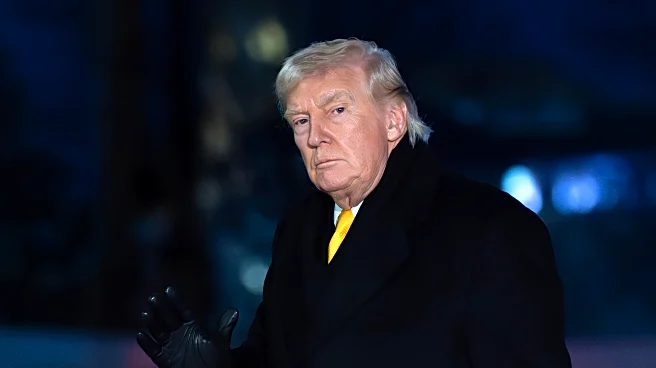What's Happening?
The American Apparel & Footwear Association, led by President Steve Lamar, has expressed concerns over the ongoing uncertainty in U.S. trade policy, particularly regarding tariffs. The association highlights the disruptive impact of tariffs on the fashion industry, noting that the pause on higher tariffs could prevent severe consequences such as product elimination and business closures. Despite the temporary relief, the existing tariffs, including the Smoot-Hawley MFN tariffs and Section 301 tariffs, continue to impose a significant burden on American companies and consumers. The unpredictability of tariff implementation, often threatened and paused by President Trump, complicates supply chain operations, leaving brands and retailers uncertain about the final costs of their orders.
Why It's Important?
The uncertainty surrounding U.S. trade policy and tariffs has significant implications for the fashion industry and broader economic stakeholders. High tariffs can lead to increased costs for consumers, affecting everyday essentials like clothing and footwear. This situation stifles innovation and strategic decision-making within companies, hindering long-term growth. The fashion industry, which relies heavily on imports from China, faces challenges in planning and pricing due to fluctuating tariff rates. The broader economic impact includes potential job losses and reduced competitiveness of U.S. companies in the global market. The association's call for a non-stacking provision in trade agreements aims to alleviate some of these pressures.
What's Next?
As negotiations with China continue, the fashion industry is closely monitoring potential changes in tariff policies. The American Apparel & Footwear Association urges the U.S. administration to consider provisions that prevent stacking of tariffs, similar to agreements with Japan and the EU. The outcome of these negotiations could influence future trade deals and tariff implementations, impacting the cost structure for imports and the strategic planning of companies. Stakeholders in the fashion industry are likely to advocate for more stable and predictable trade policies to support business continuity and growth.
Beyond the Headlines
The ongoing trade policy uncertainty highlights broader issues in U.S. economic strategy and international relations. The fashion industry's reliance on imports underscores the interconnectedness of global supply chains and the need for coherent trade policies. The situation also raises ethical considerations regarding the impact of tariffs on consumer prices and the accessibility of essential goods. Long-term shifts in trade policy could influence the industry's sourcing strategies, potentially leading to increased domestic production or diversification of import sources.










